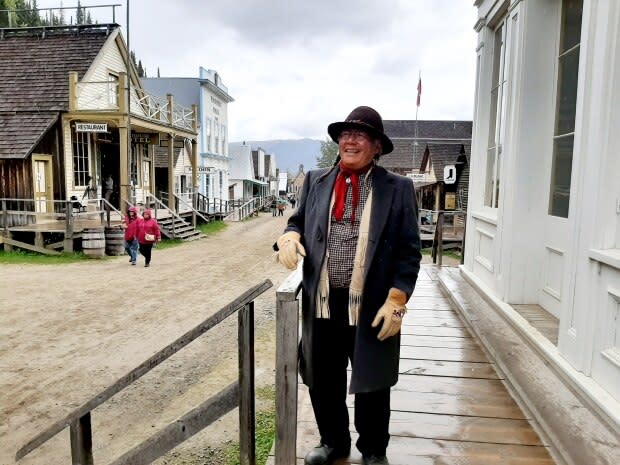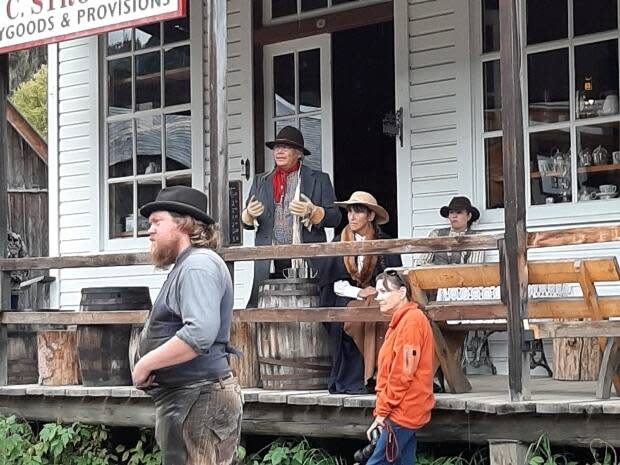After the Gold Rush: 160 years later, Barkerville includes First Nations' stories at living museum
Every summer, 60,000 tourists flock to Barkerville Historic Town and Park to marvel at rustic gold rush buildings and interact with actors portraying Chinese miners, American gold panners, dance hall girls, and a hanging judge.
The actors, hired by the museum and dressed in historically accurate costumes, roam the dusty streets and precariously raised sidewalks as they entertain and educate about the Cariboo Gold Rush.
But for 50 years, at the largest living history museum in western North America, tourists never saw an Indigenous character.
That changed this summer when Barkerville, which is located about 700 kilometres north of Vancouver, recruited its first Indigenous interpreter.
James Douglas who heads public programming at Barkerville described the move as historic.
"A place which has been a bastion of B.C. heritage tourism for more than 50 years now finally has a First Nations' voice," Douglas said.
Barkerville, he said. is primarily known for telling the settlers' myth. That will change with a First Nations interpreter on staff.
Different take on Confederation
Barkerville hired Mike Retasket, a former chief of the Bonaparte Indian Band, for the position.
Retasket, 60, of the Shushwap Nation, has worked as an environmental activist and Indigenous consultant, and helped create B.C.'s First Nations Leadership Council.
Over the summer, Retasket roamed the Barkerville streets with the other costumed characters, dressed in beaded buckskin, his grey hair parted into two braids.
Earlier this month, as tourists gathered around the porch of a dry goods store, costumed characters launched a historical skit about Confederation, and this time, a First Nations character had a speaking part.

In character, Retasket stepped up to deliver his lines, slowly and thoughtfully. "We welcome you here. When you first came, there were only Indians. On our land."
Later, in an interview across the street in a historic gold-measuring office, Retasket, elaborated on the First Nations' perspective on an area that became the epicentre of B.C.'s gold rush in the mid-19th century.
Long before the gold rush, seven different First Nations travelled through the Barkerville area and gathered medicinal plants, he said. First Nation travellers knew about gold in the area, but mined it sparingly for medicines.
"We took what we needed," Retasket said. "There was more of a rush for blueberries and soap berries than gold."
'We were dispossessed'
But life changed when miners poured into what later became Barkerville, Retasket said.

"When the first gold claim was staked, it displaced us from the ability to use this land," he said. "Not very long after that, we were dispossessed from the land. Displaced and dispossessed."
Nonetheless, Retasket said First Nations helped early gold miners with provisions. A First Nations fishery on the Bowron River provided food.
Retasket shared these stories over the summer with thousands of tourists.
Judge Begbie's courtroom
He also talked with visitors about a controversial historical figure, Justice Matthew Begbie, B.C.'s first chief justice, known to some as the hanging judge.
Begbie is reviled for his role in hanging six Tsilhqot'in chiefs in 1864.
His place in history is so contentious that New Westminster decided this year to remove Begbie's statue from the courthouse grounds.
And yet, for years, Barkerville has offered visitors a historic re-enactment of Begbie's courtroom.
Tsilhqot'in Chief and Tribal Chair Joe Alphonse has called on Barkerville to review that portrayal.
Retasket said Begbie's legacy is mixed. But he said watching the Begbie re-enactment at Barkerville scared him.
"If I had crossed paths with him [in the 1860s] out on the land,...it would have been a very, very difficult time. He was judge and jury and some of his decisions are very questionable."

History as reconciliation
Retasket sees his work in Barkerville as an act of reconciliation.
And it's work that's going on across Canada.
Interpretation Canada, a national association of heritage interpreters, told CBC it's "an important topic of discussion.
"We have been asking tough questions about our role in reconciliation for a few years now," said Pam Murray, Interpretation Canada's chair.
"It is critical for indigenous interpreters to ...to speak their own truths, especially the truths that make settlers uncomfortable."


